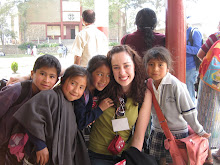Today we took a boat from "Pana" to Santiago for shopping, a tour of the town square and a visit with some scholarship students. The sky was hazy, obscu
ring the view of the volcanos surrounding the lake.
Two young girls were on board to peddle their homemade crafts during the 45-minute ride. At first, having been instructed to let us come to them, they hung back and timidly watched us as we mingled and got to know one another. Dressed in the traditional Mayan clothing that they also sold, they were striking: clear mocha skin, thick jet black hair with eyes to match.
I bargained with them to buy a black velvet purse embroidered with multicolored flowers and trimmed with fringe. They allowed me to test my weak Spanish, and I asked if I could take a photo. They eagerly said yes. I kept chatting with them in my broken but enthusiastic Spanish (a French degree really hasn't come in handy very often!).

Estella (above left) is 17, I learned; Lelila is 15. The elder wanted to live in the States. She wanted help, a friend who could help her get there and get started. I gave her my email address, thought at first I felt odd about the situation. I hope they'll write. (They didn't.)
The children are amazing--especially the scholarship kids--Maria, Juan, Jose and Petrolina. It costs almost $3,000 to send them to school--a significant amount here. They've inspired me and exhausted me. I felt an overwhelming sense of compassion. These kids work so hard--and they've got little to show for it. Their father, Nicholas, is a brick layer. He's a kind man who wants the best for his children. He only had two years of school because his parents couldn't afford to send him. They needed him to work. He wants better for his kids, he says
Casey and Kathy with Maria and her siblings
Maria's father, Nicholas, is in the back right
Their home in Santiago de Atitlan. We were warmly received!
Maria's 6-year-old sister, Petrolina. I have a 6-year-old sister, too. Petrolina is so adorable, a real cuddle bug!
Being here has allowed me to revisit memories of Korea--the teaching and societal observations. There, parents spend massive amounts of money to educate their children. Here, the parents do the same, in a less ostentatious and more desperate way. Parents in Korea want their children to have the best education so they can continue to be the best--for their family and their country. The best scores, the best schools, the best colleges. Harvard or bust. Here, parents want better for their children in a realistic, proportional way. They want books for their children, they want a good job, a life outside of poverty.

No comments:
Post a Comment